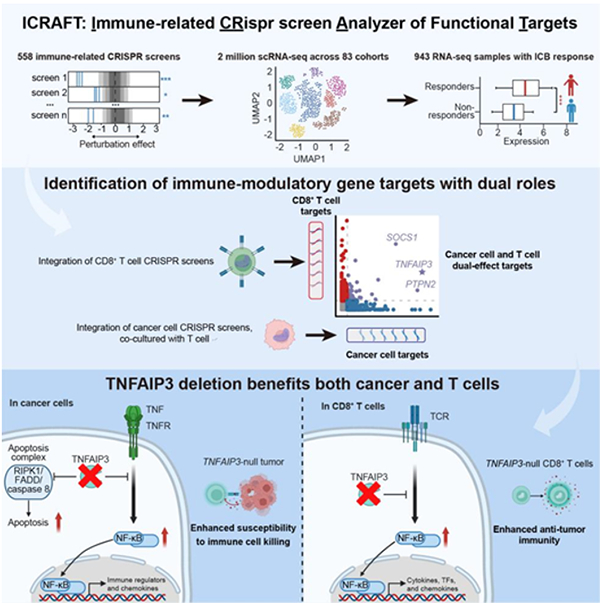

Figure ICRAFT target discovery process, schematic diagram of targeting
TNFAIP3 to promote tumor immunity in cancer cells and T cells
With the support of the National Natural Science Foundation of China's
"Digital Decoding of Immunity" major research project (approval number:
92374116), researchers such as Zeng Zexian from Peking University's Frontier
Interdisciplinary Research Institute, Pan Deng from Tsinghua University's School
of Basic Medicine, and Gao Zhidong, chief physician at Peking University
People's Hospital, have conducted collaborative research and made new progress
in the discovery of tumor immunotherapy targets. The research findings, titled
"Integrated Computational Analysis Identification of Therapeutic Targets with
Dual Action in Cancer Cells and T Cells," were published on February 28, 2025 in
the journal Immunity. The link to the paper is:
https://doi.org/10.1016/j.immuni.2025.02.007 .
Tumor immunotherapy has made many breakthroughs in recent years, but there
are still difficulties in screening therapeutic targets, killing cancer cells
while damaging anti-cancer immune capabilities, and other issues. In response to
the above challenges, researchers have developed an ICRAFT tumor immune target
identification platform based on CRISPR genomics(
https://icraft.pku-genomics.org ). As a fully open source online analysis
platform, ICRAFT can provide interactive data analysis and high-quality,
standardized data resources. The research team used the ICRAFT platform combined
with cell and animal experiments to identify multiple key genes with dual
regulatory abilities, such as TNFAIP3; Analyzed the mechanism of action of
TNFAIP3 in the tumor microenvironment; Verified that targeting TNFAIP3 can both
weaken the immune escape ability of tumor cells and enhance the anticancer
efficacy of T cells; Provide important potential targets and theoretical basis
for future development of combined immunotherapy strategies.